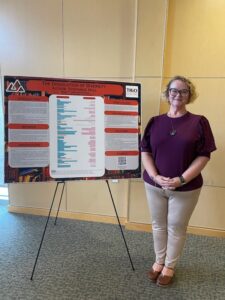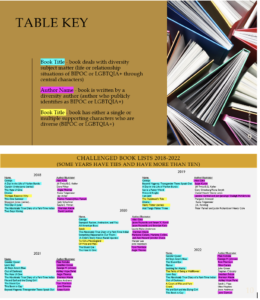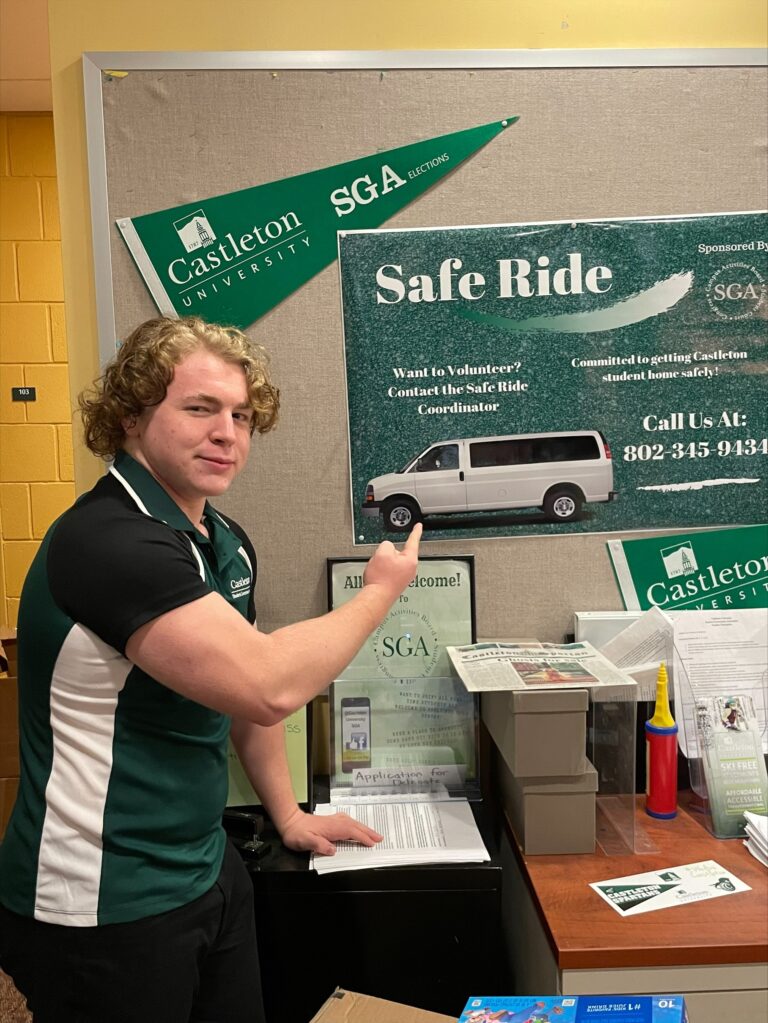VTSU grad researches banned books

Where is the line between prote/cting children from the unknown and denying children information?
This question is at the heart of VSC graduate, parent, and librarian Stephanie Hull’s research on banned books as part of the McNair Scholars Program.
Hull’s journey into education advocacy actually began as a professional chef after leaving what she called an unfulfilling English degree program.
While creatively fulfilling, her life path changed yet again with the arrival of her first born when she knew she could no longer maintain the long hours required for running a hustling kitchen.
After dedicating time to her family, she later returned to school as her two youngest were starting second grade, not as a fellow student, but as a substitute teacher. Yet before long, Hull was maintaining several positions at the school full-time including her favorite role as a library assistant.
It was there where she rekindled her lifelong love of books and storytelling.
Sensing another change for the sake of passion and creativity, Hull said she knew in the library was where she wanted to end up.
“Librarians are like these super mythical creatures who seem to know everything and have the best stories,” Hull says when recalling her decision. “Liberians are magical by association.”
The subject of book banning was introduced to her as a student and spurred by her strong beliefs of intellectual freedom, especially for children. Her McNair project, titled “The Dissolution of Diversity,” focused on how diverse authors and stories, specifically the BIPOC and LGBTQIA+ community, made up most of the top 10 banned books in the country from the past five years, despite making up less than 5% of published works within the industry.
According to the American Library Association, 2023 saw a 20% national increase from 2022 in attempts to censor or challenge library materials, services, and books. That means between Jan. 1 to Aug. 31 there have been 1,915 documented challenges to unique titles, most of which are either written by people of color, members of the LGBTQIA+ community, or contain even a mention of either subject matter.
But the issue is going beyond our libraries as well.

Just last month, Scholastic, a multi-billion dollar educational and publishing company best known for their annual Book Fairs, was accused of diversity censorship in light of a new company policy amidst the recent surge of nationwide book banning. However, many teachers and librarians, including Hull, said their intentions actually contributed more to the problem than it solved.
“I was appalled when [they] offered the sort of ‘selective banning’ for book fair. Especially because I had just written this huge research paper on how diverse stories are imperative in building empathy and understanding in communities. It just made my heart sink and made me realize that there is much more work to be done so that diverse authors and stories can do just that,” she said.
When asked her opinion on how Vermont potentially contributes to this turbulent culture, Hull was optimistic but remained cautious:
“I think that Vermont is generally more open-minded and has not greatly contributed to book-banning culture. We have very few instances of challenges and bans and generally, books are retained in circulation,” she said. “However, not all Vermonters have those beliefs. The idea of book challenges and bans encompasses so many different things such as morals and religion and political beliefs… it would be so easy for a shift to happen in the direction that books are being pulled and banned and burned that it is really a terrifying thought.”
The average person may not share Hull’s concerns or even find them exaggerated, but librarians nationwide know they’re certainly founded in truth. A story from TIME magazine reported that in September of 2021, a library in Victoria, Texas was threatened with eviction by the county commission after the director of library services refused to remove over 40 books from the shelves at the request of a group of residents over concerns that certain materials contained “pornographic or obscene materials.”
Many of the books evaluated were LGBTQ children’s books.
Although the county didn’t provide funding for the library, they did own the library building’s lease. The mayor of Victoria additionally stated that if the library didn’t revise its collection and limit the availability of “alternative lifestyle children’s books” by that October, the City Council could decide to freeze the library’s budget.
When asked how students, parents, and citizens can help support our libraries, Hull was quick with some advice.
“Stories cannot be silenced if we keep buying them and reading them and promoting them. The ALA has wonderful recommendations for advocacy, equity, diversity, and inclusion… The biggest and best thing you can do is to continue to seek knowledge. Walk into that magical library, ask the librarian to help you find one of these diversity stories, and read it. That story becomes part of you and now you have a little magic to pass on to someone else.
McNair Program Director Britt Green spoke highly of Hull’s work on the book banning research project.
“Stephanie is truly passionate about the topics that she researches and plans to continue this journey in a Master of Library and Information Sciences Program (MLIS). She has already been accepted into an incredible MLIS program with an amazing funding offer! I am very excited to see the groundbreaking work that Stephanie brings to her next academic institution,” Green said.







